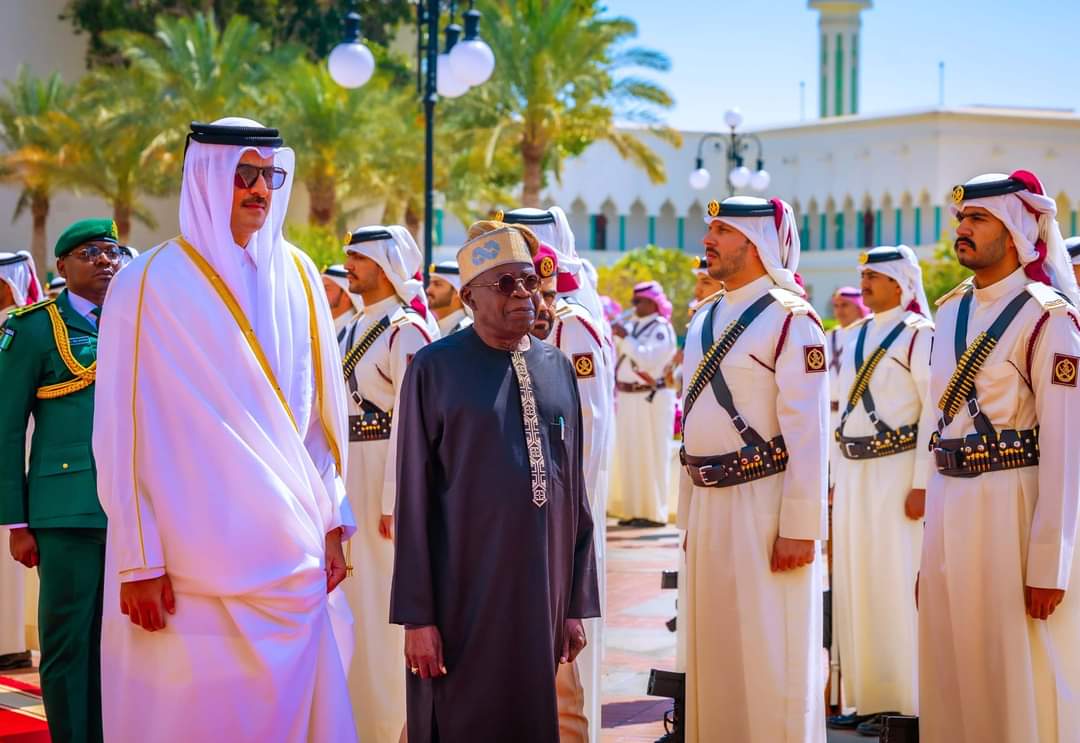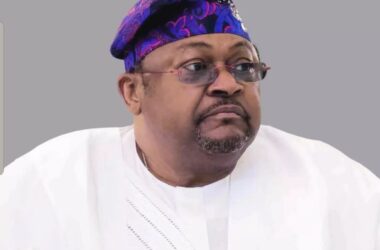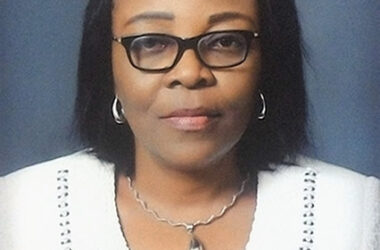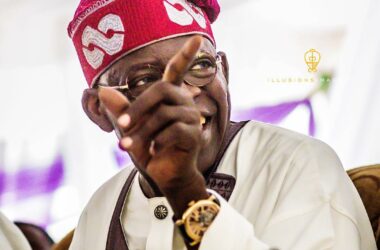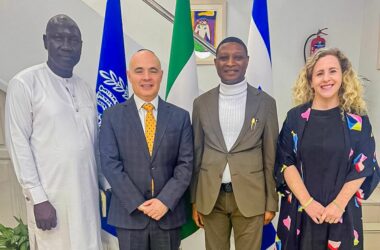As was the case on his previous business missions abroad, Nigerian President Bola Tinubu’s recent visit to the oil-rich Emirate of Qatar was aimed at presenting a different face of Nigeria to the world, different from the stereotype that has, unfortunately, enjoyed the most traction in the imagination of the international business community over the years. This stereotype of Nigeria presents her as a place where it is extremely difficult, if not impossible, to transact any legitimate business without cutting corners, and a country where the systemic and regulatory frameworks serve more as hurdles than enablers – let alone facilitators.
But, as the President has reiterated time and time again on these trips, that narrative of Nigeria is a false (or, at best, an exaggerated) one, and it pales in comparison to the immense possibilities the country’s economy offers the discerning investor. This was the theme of his engagement with business and government leaders in Doha, the Qatari capital, where he not only gave a comprehensive overview of the steps his administration has taken since its inception last May to remove the bottlenecks that have historically impeded the growth of key sectors of the Nigerian economy.
In Doha, where he spoke at the Nigeria-Qatar Business and Investment Forum, Pres. Tinubu demonstated a rather pained awareness of the corrosive impact of these bottlenecks, and of the activities of those he described as ‘entrenched interests’ who exploit the predatory nature of the regulatory system to rip off (or otherwise impede) would-be investors – local and foreign alike. This time, though, Tinubu accompanied his overview and assurances with a series of warnings and even threats of severe sanction. Not only was he removing the bottlenecks standing in the way of a robust investment profile in Nigeria, he informed his hosts, he would deal decisively with anybody who was deliberately acting to undermine investor confidence in the Nigerian economy. In particular, he requested Qatar’s captains of industry to report any government official who demanded a bribe or any form of inducement in the course of their business endeavour, assuring them that they would get a prompt hearing from his office. “Forget about whatever you heard …’, he added. “Whatever … some of you might have experienced … is in the past, because there (will be) no obstacle in the future.” Offering bribes to government officials, he added, would no longer be par for the course as far as Nigeria’s business environment is concerned. “If (a bribe) is requested or taken from you, report to us”, he said. “You will have access to me … Do not let perceptions become a hindrance to your will to invest.”
In revolutionizing investment promotion in Africa’s largest economy, Tinubu asserted, his government has made sure that, as far as the repatriation of funds is concerned, it is ‘free entry, and free exit.’ The time has come, he said in summarizing his overview, for investors to be more intentional in their quest to tap into Nigeria’s economic potential, which – as the entire world knows by now – is near-limitless, especially in respect to its wealth in oil and gas as well as solid minerals and agricultural resources. “I do not see why we cannot become prolific partners in exploring iron ore,” he told the Qataris, “as well as steel production, and energy across the board.”
If there was any question as to whether the Qataris were enthused by President Tinubu’s attempts to woo investors from that country, these questions were quickly dispelled by the response of key political and business figures – notably the country’s minister of commerce and industry, Sheikh Mohammed bin Hamad bin Qassim Al Abdullah Al Thani, who, in welcoming the Nigerian leader and his team, noted the many advantages offered by Nigeria’s population, demography and market, and said his country would prioritize new investments in low carbon initiatives, mineral products, petro-chemicals, industry, and consumables.
In hindsight, it may well be said that President Tinubu’s decision to engage with Qatar at this time is nothing short of a masterstroke. Previous ties or not, who can deny the importance of Qatar these days? Like a flyweight boxer punching way above his weight category, that tiny sheikhdom has – on the strength of handsome royalties from its vast oil reserves, as well as a highly diverse FDI portfolio – seen an astronomic growth in its economy, and a near-miraculous transformation in its Human Development Index (HDI), which has consistently remained at, or near, the top of every global ranking for decades now. In recent years, Qatar had been intentional and assiduous in doing what many resource-rich nations (Nigeria inclusive) failed to do: diversify its economic and revenue base via investments in critical non-oil sectors such as manufacturing, real estate, shipping, solid minerals, tech, renewable energy sources, and even (in the case of Qatar) … FOOTBALL! Long before the country captured global attention when it secured the right to host the 2022 FIFA World Cup (the Middle Eastern, Arab and Muslim-majority to do so) Qatari money had already made its presence felt in the world’s most prestigious football leagues – talking about the English Premiership, Spain’s la Liga, the Italian Serie A, to name a few.
All in all, therefore, not a bad choice of an economy to be doing business with. In its present state, Nigeria’s economy could do with some infusion, not just of Qatari cash but also its ideas, as President Tinubu did not fail to remark on. “We have seen clearly the rapid pace and thorough quality of Qatar’s development process. It is impossible not to be moved by what you have accomplished. The leadership in this country has proven its mettle…”
The high point of President Tinubu’s mission to Doha was the formal signing of seven historic agreements between the two nations – aimed at opening a gateway for mutual cooperation in pivotal sectors. The seven agreements were: A cooperation agreement in the field of education; regulation of employment of workers with the Government of Qatar; the establishment of a Joint Business Council (JBC) between the Qatar Chamber of Commerce and Industry and the Nigerian Association of Chambers of Commerce, Industry, Mines, and Agriculture (NACCIMA); and a cooperation agreement in the field of youths and sports. The other agreements are: cooperation in the field of tourism and business events, and a Memorandum of Understanding to combat the illicit trade in narcotic drugs and psychotropic substances. At the signing ceremony, which the President witnessed along with His Highness, Sheikh Tamim bin Hamad Al Thani, Emir of the State of Qatar, Tinubu once again buttressed Nigeria’s readiness to guarantee a healthy ROI, not just in minerals or agriculture, but also in human capacity, as well as his commitment to work towards a business environment that fosters and rewards innovation and in particular, the dynamism of Nigeria’s young people. “They have energy, talent, and self-belief,” said the President. “They are quality partners for Qatari industry. They are educated and reliable, and they are proactively seeking to add value wherever they are.”
Recalling his own trip to Nigeria in 2019, The Emir of the State of Qatar, in his response, said his country, too, was open to President Tinubu’s investment drive. He had seen first-hand, he said, Nigeria’s potential as an important and strategic ally of Qatar’s within the context of its role in regional affairs. “I have no doubt,” the Emir said, “about the … capacity of the Nigerian people. Everywhere in the world, they are known for their brilliance and hard work.” However, he added pointedly, “We only need to ensure that this is happening inside of Nigeria rather than outside.”
The time had come, the Emir acknowledged, to replicate in a country like Nigeria the investments Qatar had made around the world (which, he added with evident pride, had been very fruitful, thank you very much!), and expressed confidence that President Tinubu’s reforms might just be the tonic, the push, the Qatari government and business community needed to make amends for its previous lack of an investment footprint in Africa’s biggest economy.
Since that engagement, the Qatari monarch has been as good as his word, pledging to send a team of officials on a fact-finding visit to Nigeria after the holy month of Ramadan, which would interface with the FG’s led by Finance Minister Wale Edun.
In the aftermath of yet another eventful interface with Nigeria’s current and prospective development partners by the Tinubu administration, it is the hope of all stakeholders that the fruits thereof would not be long in coming.
|


